|
Custom House Quay
Also in Bench Street
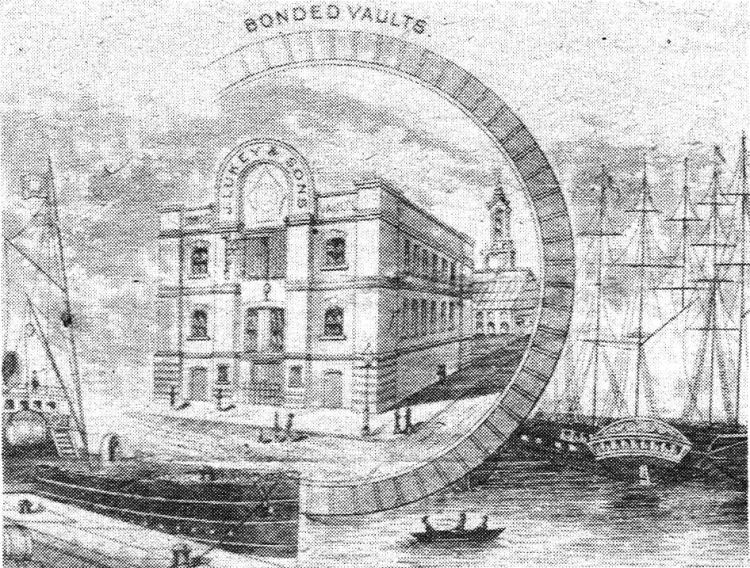 |
|
Lukey's bonded stores which stood on Custom House Quay
near the Hotel de Paris and next door to the "Pavilion
Hotel". |
LUKEY John & Sons also had a shop at 4 Bench Street in 1899 and 1901
 as shown in
Kelly's Directory. That would put the shop between the "Guildhall
Vaults" at number 2, and the "Shakespeare
Hotel" later to become the "Crypt Tavern"
at number 10. The building shows a sign on the frontage that says
"established 1852". as shown in
Kelly's Directory. That would put the shop between the "Guildhall
Vaults" at number 2, and the "Shakespeare
Hotel" later to become the "Crypt Tavern"
at number 10. The building shows a sign on the frontage that says
"established 1852".
|
From the Dover Express, Hythe News, and East Kent Intelligencer,
Saturday, 29 October, 1864.
DRUNK AND DISORDERLY
Stephen Lazlett, a porter in the employ of Mr. Lukey, wine and spirit
merchant, Bench Street, was charged with being drunk and disorderly on
the previous evening, and also with annoying his employer.
Mr. Lukey stated that on the previous evening defendant came to him,
in his office, in a state of intoxication. Defendant made use of very
abusive language towards to him, and as he would not desist he gave him
into custody.
In reply to the Magistrates Mr. Lukey said that he did not wish to
press the charge, as he intended to discharge the defendant from his
employ forthwith.
The Magistrate said that under these circumstances defendant would be
dismissed on his paying the costs, 2s.
|
|
From the Dover Express and East Kent Intelligencer,
10 December, 1864.
STREET ACCIDENT
One day in the early part of the week a horse attached to a light
wagon belonging to Messrs. Lukey and Son, took fright as it was driven
along Priory Street, and running against a gas lamp overturned the
wagon, smashing a great portion of its contants.
|
|
From the Dover Express and East Kent News, Friday, 24 June, 1870.
DRUNK AND INSOLENT
John Day, a “tradesman” on the road, was charged with being drunk and
causing an obstruction on the footway in Bench Street, on the previous
morning.
Superintendent Coram said that on the previous day, between eleven and
twelve o'clock, he saw the prisoner on the pavement in Bench Street. He
was the worse for liquor, and his (the Superintendent's) attention was
called to him by the noise he was making. He asked the prisoner what was
the matter with him, and in reply the prisoner said “Who are you?”
Witness told him he was the Superintendent of Police; and that if he did
not conduct himself in a more orderly manner in the public thoroughfare,
it would be his duty to take him into custody. Prisoner said he did not
care for forty superintendents; and contested his right to act as he
thought proper. He continued his offensive conduct, and witness at
length took him into custody, and conveyed him to the station-house. On
his way he made use of various threats, and his conduct there was very
bad. Amongst his effects was found a formidable looking stone.
Prisoner: Yes, I picked it up, and intended to take it to London, as a
curiosity.
The statement of Superintendent Coram was corroborated by Mr. John Lukey,
a wine-merchant, of Bench Street, who was standing at the entrance of
his premises at the time of the prisoner's disorderly conduct, and saw
all that occurred. In the first instance the prisoner's demeanour was
very disorderly, and after the Superintendent of Police spoke to him he
became menacing in his manner, and he thought more than once that the
prisoner intended to strike the Superintendent.
The prisoner denied that he was either drunk or insolent; and asked the
Magistrates to discredit the statement of “those two men.”
The Bench, however, had not the slightest doubt that the statements of
Superintendent Coram and Mr. Lukey were correct; and in default of the
prisoner paying a fine of 10s. 6d. and the costs, sent him to prison for
fourteen days.
|
|
From the Dover Express and East Kent News, Friday, 15 May, 1874. Price 1d.
MR LUKEY'S STORE
The Surveyor reporting on the plans of Mr. Lukey's store at the Pier,
said they were in accordance with the bye-laws, and in reply to Mr. Fry
he reported that the building did not interfere with the proposed Pier
improvements.
Mr. Fry called attention to the fact that Mr. Minet's house in Strond
Street, having been pulled down, the old building line was gone. He
asked if the Corporation could now fix a line in accordance with the
other buildings.
The Town Clerk referring to the statute bearing on the case, showed that
the Council might do so, but they would not have to pay such an amount
as arbitrators might decide upon for the land surrendered.
The plans were adopted.
|
|
From the Dover Express and East Kent News, Friday, 7 May, 1875. Price 1d.
FALL OF A BUILDING
On Wednesday evening a large new store, standing between Strond Street
and the Granville Dock, belonging to Messrs. Lukey and Son, wine
merchants, fell with a sudden and terrible crash into the street
opposite the London, Chatham, and Dover Railway. At the time, labourers
were employed in putting on the upper floors cotton seed that was being
discharged from the ship Odborne, lying at the neighbouring quay, and at
the time of the calamity we are informed that there were several hundred
tons of seed on the floors.
It is a remarkable circumstance that no personal injury was sustained by
any one in the disaster. Seven or eight men had been engaged on the
floor a few minutes before and had gone down to the ship to get their
“allowance” when the building fell. The street at this point is usually
busy especially in an afternoon, but happily when the crash occurred the
place was clear and the only thing buried in the ruins was a fish
barrow. Several persons, we believe, had narrow escapes. Miss Iron and
two children had a moment before passed by and entered Mr. Mutton's
stationery shop, opposite; a railway porter was in the street talking to
a person to whom he was delivering an excursion bill and hearing a low
crash he ran and escaped, a soldier was also standing near and he took
to his heels and saved himself. The shock is described as like that of
an explosion and for a few minutes after the accident it was not
possible to see what had happened the air being filled with dust.
The building after the calamity presented the appearance of a complete
wreck on the side next Strond Street. The whole frontage wall of about
sixty feet was thrown down into the thoroughfare, and over its ruins had
run out the cotton seed, and upon that again were the broken fragments
of the roof. The said wall of the west stood firm, but the one on the
south side was much cracked, and had to be shored up to prevent it
falling against the adjoining house. Men were at once engaged to clear
away the debris, and the work was continued all night, so as to open the
thoroughfare as soon as possible.
As no doubt competent persons will be consulted as to the cause of the
breakdown it would be premature on our part to venture an opinion. We
are informed that an independent surveyor from London has been called in
to make a report. As far as we can glean the facts, we learn that the
building was erected last year at a cost of £3,000, Messrs. Whitley and
Fry being the architects, and Mr. Adcock the builder. It was built as a
bonded wine store for Messrs. Lukey and Sons, Bench Street, the basement
being prepared for that purpose. The upper part was let as stores for
cotton seed to the Oil Seed Crushing Company. The accident being of an
exceptional character, we believe no insurance covers it.
|
|
From the Dover Express and East Kent News, Friday, 11 November, 1887. Price 1d.
ROBBING THEIR EMPLOYEES
William Curtis, and Walter Stephens, stablemen, in the employ of Messrs.
Lukey and Sons, wine merchants, bench Street, were charged with stealing
from a store in Chapel Lane, 12 bottles of ale value 6s. the property of
their employers.
Mr. Mowll appeared for the prosecution, and after briefly stating the
facts of the case the following witnesses Sergeant Suters said: I was
ordered to go to Mr. Lukey's stores in Chapel land on Thursday, Friday
and Saturday evenings last week. I went there on Sunday morning about
one a.m. with Police-constable Knott. I went into the claret store,
which is the floor between the bottle store and the ale cellar. The
claret store is level with the street, and the proper entrance is from
the street. There is a trap hatch from the bottle store to the claret
store below, and then there are steps into the ale cellar. I remained on
the premises from one a.m. until nine a.m. The stables of Messrs.
Lukey's and Sons, immediately adjoin the stores where we stopped. About
8.30 a.m. I heard a sound like some bottles being moved, and then
someone said something about gin, and one asked the other if he wanted
any water with his gin. I recognized the voices as the prisoners.
Shortly afterwards I heard baskets being moved about and someone was in
the bottle store which was over my head. Shortly after the trap opened
into the place where I was, that is into the claret store, and a ladder
was put down. There are two traps and the prisoner Curtis went towards
the other trap which leads to the coach house, and said, “You know what
to do if anybody comes” and the other man answered, “Yes, all right.”
The prisoner Curtis then came down the ladder into the claret store, and
he had got the basket (produced) with him. He went down into the ale
cellar, but before going down he struck a match and lit something, and
then went into the cellar with a light. He was down there a few minutes,
and then came up carrying a basket on his shoulder. The prisoner was
about to ascend the ladder, when I stepped out in front of him and said
“ this is a nice game, what have you got in the basket.” He replied, “a
dozen of beer.” I then told him to put the basket down which he did, and
I saw it contained the bottles of beer, like it does now. I said “I
suppose you know who we are,” and he said “Yes.” I told him I was going
to take him into custody for stealing the beer. The prisoner begged very
hard to be allowed to put back the beer, and said that it always had
been done only he happened to be the unlucky one to be caught. I took
him round to the stable for his coat, as he was in his shirt sleeves. I
found the stable door fastened, but after knocking several times the
other prisoner Stephens admitted us. When we got into the stable Curtis
said to Stephens “I am copped,” and Stephens replied “what do you mean
copped?” The prisoner Curtis replied, “Why taking the beer, and I shall
have to go to the Police Station,” and he was charged with stealing 4
quarts and 8 pints of ale belonging to Messrs. Lukey and Son. In answer
to the charge he said, “it always has been done, but I am the unlucky
one.” I afterwards arrested Stephens at his house, and I told him I
should take him into custody for being concerned with Curtis in stealing
a dozen bottles of beer. He replied, “I do not know anything about it, I
cannot help what he (meaning Curtis) does.” I then took him to the
Police Station where he was charged and detained. I was at the stores on
Saturday, and in the morning I heard corks being drawn, that was between
6 and 7 o'clock, and happened in the coach house. I could hear two
persons talking, and I have since recognised the voices as the two
prisoners. One of them said “are you going to have any bottles over this
morning?” and the other answered “isn't there any more there, they
cannot be all gone yet.” After a few minutes the prisoner Stephens said
to Curtis “have you had your drink?” and Curtis answered, “Yes, but I
could do with another before I go,” and then I heard another cork drawn.
Someone then went away with a van and the stable door was shut. Shortly
after that, another cork was drawn.
By the prisoner Curtis: I could hear the corks drawn in the stable, from
where I was in the claret store, and I heard four corks drawn on
Saturday, but I did not hear any drawn on Sunday.
By the prisoner Stephens: I had to knock several times before you opened
the stable door to us on Sunday morning.
In answer to the Chairman, Sergeant Suters said there was an empty gin
bottle and a number of drawn corks in the harness room. I searched the
prisoner at the station and found on him a wax taper, a corkscrew, a
pipe, and a purse, but no money.
P.C. Knott, said: I was with Sergeant Suters on Thursday, Friday, and
Saturday nights, and also Sunday morning, at Mr. Lukey's stores. I have
heard what he has said, and what passed on Saturday and Sunday mornings,
is quite correct. I corroborate the whole of his evidence, until the
time of taking Curtis to the Police Station.
By prisoner Curtis: I heard three corks drawn before you went away with
the van on Saturday morning, and one cork drawn after you left. I did
not hear any corks drawn on Sunday morning. The half gallon jar of gin
was on the table in the harness room.
By Stephens: I only heard corks drawn on Saturday morning. I did not see
you in the stable, until I saw you yesterday morning.
Mr. Ewdard Lukey, said; I am a partner in the firm J. Lukey and Son. The
prisoner Curtis has been in my employ from march 1995, and the other
prisoner from July 1887. I have for sometime past, missed bottles of ale
from the store. Neither of the prisoners had any right to be in the
stores on Saturday last, but only in the stable to look after the
horses. There is an entrance to the claret store from Chapel Lane, and
that is the proper entrance. The trap hatch from the coach house to the
bottle store is for empty bottles to go up and down, and the other trap
is for clean bottles to go down to the claret and ale stores. These trap
hatches are closed every night and they did have bolts, but they are
broken. Having suspicion that the traps had been opened, I instructed my
foreman, and on two occasions I was present myself, to tie cotton on to
the trap and the ceiling, and this was done for evenings, but it was
found broken each following morning, that was previous to instructing
the police to watch the premises. Previous to the cotton being fastened
to the traps, I had taken other precautions, from which I found that the
stores had been entered. The value of the bottled ale (produced) is six
shillings, and is my property.
Lewis Button said: I am foreman to Messrs. Lukey and Sons, Bench Street.
I fastened the cotton to the trap-hatches and ceiling according to Mr.
Lukey's instructions, but on each following morning it was found to be
broken. I am in charge of the cellars and have for some time missed
bottles beer from the stores.
By Curtis: I have never seen you take any beer away.
By Stephens: I have not seen you having drink without asking permission.
The prisoners, in answer to the charge, wished the case to be dealt with
summarily.
Curtis pleaded “Guilty” and Stephens “Not Guilty.”
Mr. E. Lukey said that during the time Stephens had been in his employ
he had behaved well in every way, and he (Mr. Lukey) believed that he
had been the dupe of Curtis.
The Bench sentenced the prisoner Curtis to two months' hard labour and
Stephens to one months' hard labour.
During the hearing of the case the Court was crowded.
|
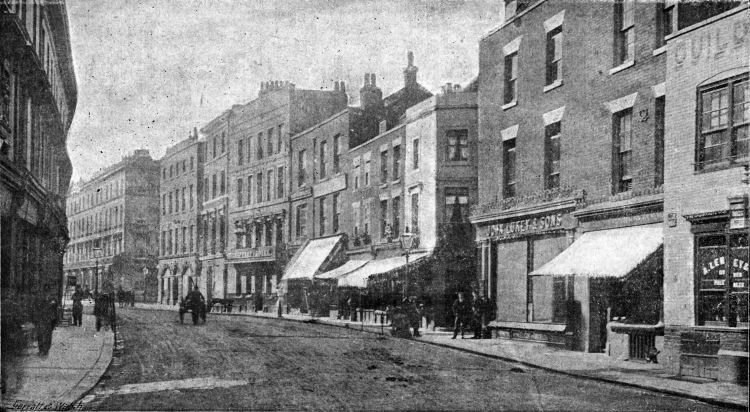
John Lukey's at 4 Bench Street, circa 1900. |
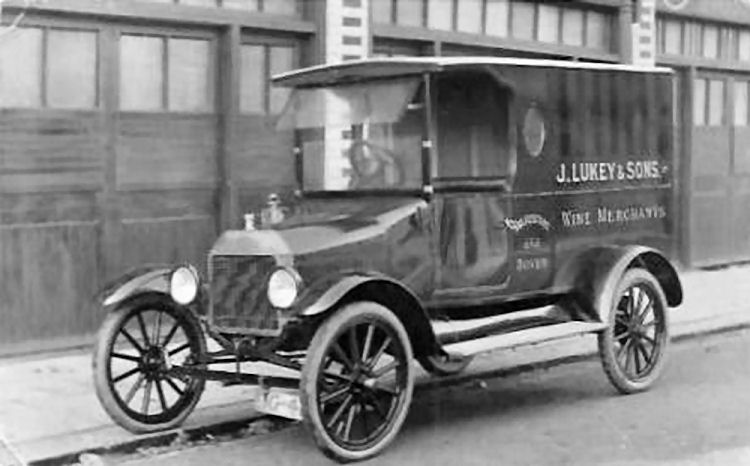
Above photo, date unknown. |
|
Dover Express, Friday 12th July 1907.
Dover Police Court, Monday.
Before M. Pepper and G. C. Rubie, Esqrs., and Captain R. B. Cay, R.N.
Cricket match.
An occasional licence was granted Mr. E. Lukey, to sell intoxicants in
one of the tents at the athletic ground during the match, and at the
Town Hall during the cricket ball, this Friday from 9 p.m. to 4 a.m.
|
|
From the Dover Express and East Kent News, Friday, 8 September, 1933. Price 1½d.
DEATH OF MISS LUKEY
We regret to record the death of Miss Mary Elizabeth Lukey, which
occurred on Monday, at 26, Radnor Park Road, Folkestone, at the age of
86 years. Miss Lukey was the second daughter of Mr. John Lukey, the
founder of Messrs. John Lukey and Sons Ltd., wine and spirit merchants,
of 4, Bench Street, Dover. She lived at 4, Bench Street, for several
years, and later at 2, Woodleigh Villas, Kearsney. Mr. Edward Lukey, her
brother, was a Mayor of Dover, a Sheriff of Canterbury, and a Grand
Master of the Ancient Order of Oddfellows.
The funeral takes place to-day (Friday), at River, at 2.30 p.m.
|
|
From the Dover Express and East Kent News, 20 March
1942.
DEATH OF Mr. JOHN LUKEY.
We sincerely regret to record the death, in his 74th year, after a
short and sudden illness, of Mr. John Lukey, Managing Director of
Messrs. Lukey & Sons Ltd. Though a Folkestone man by birth, he had been
long resident in Dover, and was keenly interested in its prosperity.
Last week he seemed in quite normal health, but on Saturday he had a
serious attack of heart trouble. He leaves a widow and daughter (who is
in South Africa) to mourn his loss. The funeral took place on Thursday,
the body being cremated at the Kent Crematorium, at Charing. The Rev. D.
H. Bowen officiated, and the mourners present were:- Mr. F. Lukey and
Mr. H. Lukey (brothers), Miss Lukey (sister), Mr. and Mrs. Spencer Apps
(brother-in-law and sister). Also present were: Mr. W. M. Lumsden, Mr.
F. Axford, P Fagg and H. Saunders (staff), Nurse brown, Mr. A. C. Leney,
Mr. Vernon Shone. Floral tributes were sent as follows:- With love,
Dolly, Peter and Bull,: Mac and Jean; Herbert, Fred, Edith and Ada; Mr.
and Mrs. Victor Smith; Mr. and Mrs. J. H. Weston, jun.; Mr. Philip T.
Hart, O.B.E.; Messrs. Thompson and Son, Walmer; Mr. and Mrs. H. J.
Allioson; Mr. and Mrs. D. I. L. Bradley, Whitfield; Directors,
Management and Staff, Esplanade Hotel; Business Group No. 4; Edward
Wright and Son; Mr. and Mrs. J. Weston, snr., Management and Staff,
Shakespeare Buffet and Crypt; Committee and Members, St. Margaret's Bay
Golf Club; Royal Cinque Ports Yacht Club; Mr. and Mrs. Saunders and Ivy;
Mr. S. F. Harman; Major and Mrs. La Trobe Foster; Office Staffs, 4,
Bench St., and 9 High St.; Nora, and all at 28, Milner Rd., Elvington;
Mr. and Mrs. Whorwell; Continental Express; Mr. and Mrs. Charles
Wind;Messrs. Mackeson and Co., Ltd.; Edith Pratt and Peggy Bryant; G. T.
Finney; Charles H. Tyrell; his Staff. The funeral arrangements were by
Mr. H. J. Sawyer, of 85, High Street, Dover.
A correspondent writes:- "By the passing of John Lukey, Dover has
lost one of its grandest men. His outstanding qualities of sincerity,
kindness and generosity, endeared him to everyone. Absolutely selfless,
his unostentatious acts of kindness were manifold.- M.F."
|
|
From the Dover Express, 14 December, 1951.
LUKEY'S BUY THE SHAKESPEARE
A Link with a Century Ago.
Over a hundred years ago, top-hatted, John Lukey, side-whiskered and
sober-faced, was mine host of the "Shakespeare" Hotel in Bench Street,
one of the renowned old Dover hostelries which had its own place in
local history many years before that.
Last week the local firm of John Lukey and Son, well-known wine
merchants, renewed the family link with that old hotel when they bought
the "Shakespeare," the "Crypt" Restaurant and adjoining premises for
£10,000.
The amusement arcade and dancing studio, all part of the lot which
was knocked down to their five-figure bid, were unheard of when John
Lukey, founder of the present firm, ran the "Shakespeare." The eight,
self-contained flats, which extend above the building, though, were
probably part of the old hotel.
Uni-leteral parking, like he atom bomb, was a thing of the future,
and John Lukey, as a fly proprietor and owner of livery stables, was
more troubled by the state of the roads than any white lines painted on
them. Whatever the state of the roads, John Lukey and his customers must
have accepted it, for it is on record than one morning they gathered
outside the hotel to give him a send-off when he set out to trot a horse
to Canterbury in two hours. Drawing a high dogcart with three men up,
the horse carried on to the agreed winning post in ten minutes under the
time to win a £5 wager.
In 1836, alterations in Bench Street had brought about the
destruction of an old tower which had stood near the "Shakespeare" for
centuries past, and underneath which the "Crypt" was discovered. The
actual origin of this structure is obscure, but it is said to have been
used as a place of refuge by the Huguenots who were then fleeing from
their own country. Many years were to elapse before their compatriots,
probably no less harassed by modern travelling condition, were to use
the "Crypt" as a place of refreshment on their way to the South Bank
site.
For some time John Lukey used it as an underground store and bottling
plant for his hotel, before founding the present firm in 1853. Not until
1921, with Mr. Shone as architect and Mr. Barwick as builder, was it
renovated and eventually opened as a restaurant. During the examinations
then carried out, a quantity of Flemish tiles were unearthed and
subsequently, used to construct the present "Shakespeare" frontage.
Until the alterations were made about 1922 which divided the building
into flats, a bar and a restaurant, it had remained a family hotel under
various proprietors, the last being Mr. W. Morris who was there for many
years.
Since then the name of the "Crypt" has become literally world-famous,
and during the last war it was the off-duty meeting place for thousands
of servicemen, coming from every nation. Just about a century before
that when John Lukey was running the "Shakespeare" Hotel, his
establishment was used as a mess by the officers of the numerous
regiments which had congregated at Dover prior to service in the Crimean
war.
Many of the wartime children preferred to use the "Crypt" as a
shelter when bombs and shells were bursting nearby. "They always said it
was safer than a shelter," says Mr. Percy D Lukey, Director and
Secretary of the firm, "or else it was just a lot nicer place to be
bombed in."
The great-grandchildren of John Lukey will continue to run the
"Shakespeare" and "Crypt" as well as the wine merchant's business which
he founder a few yards away in a building which has its own history,
being reputedly a vicarage of St. Mary's Church. Its area of business
extends far beyond Dover, and beyond the borders of Kent. The firm which
had its start in the mind of a man who bottled wines in the "Crypt" now
extends throughout the Home Counties served largely by its own fleet of
motor lorries.
|
Lukey's was eventually taken over by Unwins Wine Merchant and that
eventually closed on 20 December 2005.
|
From the Dover Express, 10 July, 2008.
LUKEY'S FUTURE HOPES
A NEW restaurant may open in Dover at the former Lukey's off-licence,
once the vicarage for St Mary's Church. A planning application has been
lodged with the council to change the use of the site.
|
|
From the Dover Express, 17 July, 2008.
PLAN FOR RESTAURANT
A RESTAURANT is set to open in Dover's Bench Street where work is in
progress at the former Lukey's off-licence, once the vicarage for St
Mary's Church.
This week a planning application was lodged to change the use of the
ground floor of 3 Bench Street, a former greengrocer's shop next door to
the former off-licence at 4 Bench Street. The applicant is seeking
approval for change of use of the ground floor so it can be used as a
restaurant.
|
|
From an email received 11 August 2010.
We have dug up a green thick glass bottle missing the neck which is broken off with the
name of Lukey, Dover and Folkstone, on it. We live in Longfield, Kent
our garden backs onto the railway line; whilst digging out a tree stump
we found the bottle in amongst the roots, we wondered it's origin.
We think this is more like a beer bottle.
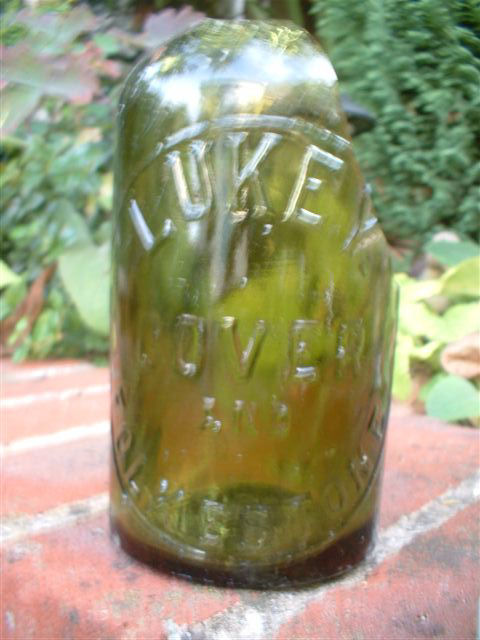
The base of the
bottle has K.B.Ltd C 9613 on it the base, is approx 2.5 inches across,
approx 4.75 inches to neck, glass approx eighth of inch thick, we hope this
is some use.
Please let us know what you find out, we wondered if it was
thrown out of the boat train or thrown away by navvies who built the
railway line in 1864.
We were told that a cavalry regiment was camped on
this land during the first world war period, it was also a cherry orchard
up to the early 1950's.
Regards John & Sue Barclay.
If anyone has any further information, please
let me know and I'll post the answers here. Paul Skelton.
BACK TO HELP
REQUIRED PAGE
|
|
From an email received 6 August 2015.
Hello,
I found this bottle in some woods in Dover whilst walking
the dog. I was wondering if you could tell me more info on the bottle.
Leigh Scott.
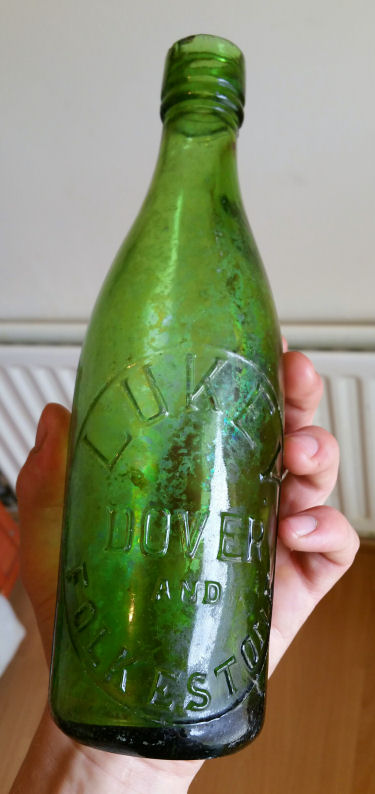 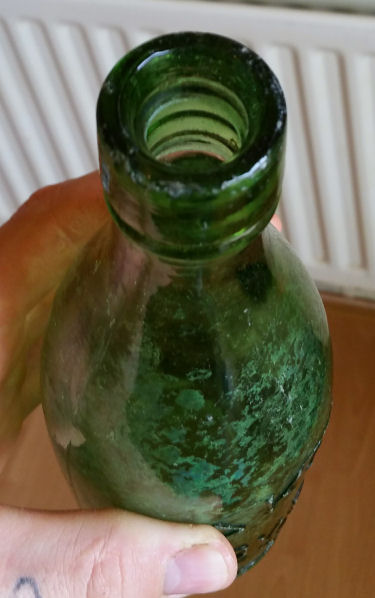
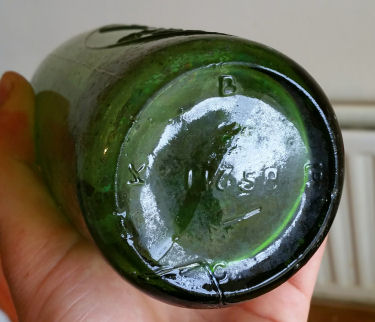
|
|
From the Dover Mercury, 5 July, 2012. 80p
RESTAURANT'S BID FOR TABLES OUTSIDE
PLANNING permission is being sought for a seating area outside the II
Rustica restaurant - the former Lukey's wine shop - in Bench Street,
Dover.
A barrier will also be put up to separate the seats and tables from the
rest of the precinct area.
Among the other plans being considered by district councillors at the
moment is one for the conversion of 8 Clarendon Place, Dover, into two
self-contained flats.
|
|
From an email received 4 December 2015.
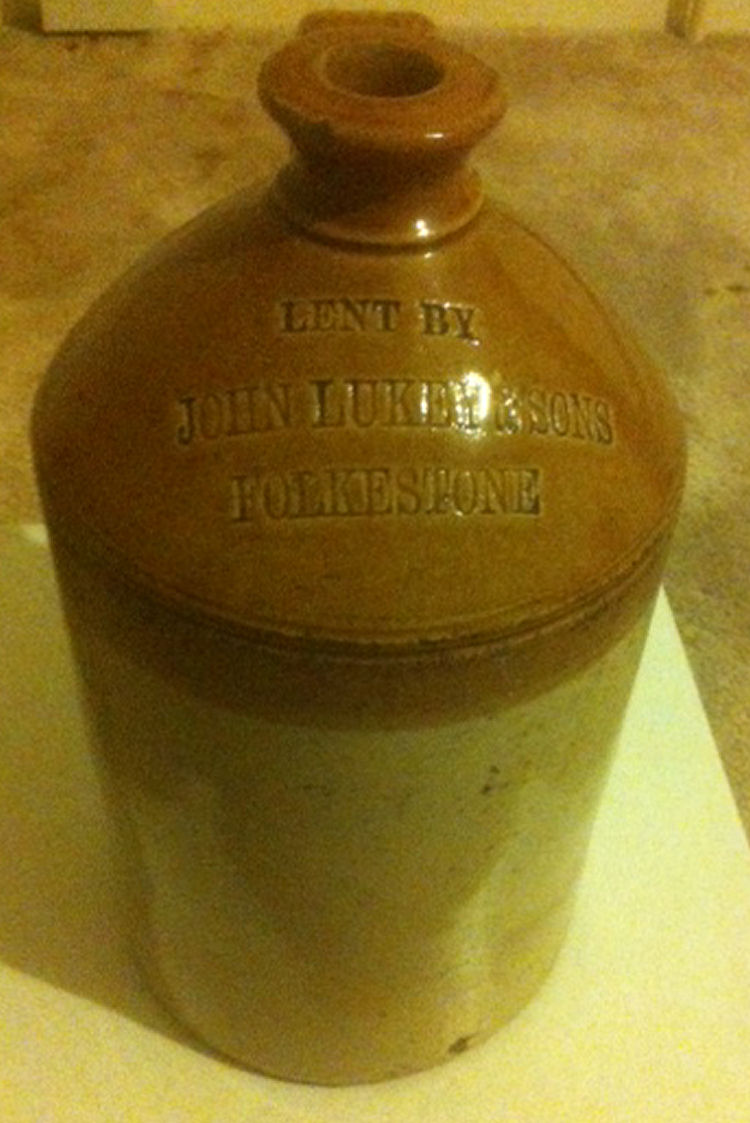
Above photo kindly sent by Heather Foster. |
|
From an email received 13 January 2020. I found this bottle under
seawater at Curaçao, north of Venezuela at 20 feet under water.
Rob Sprockel.
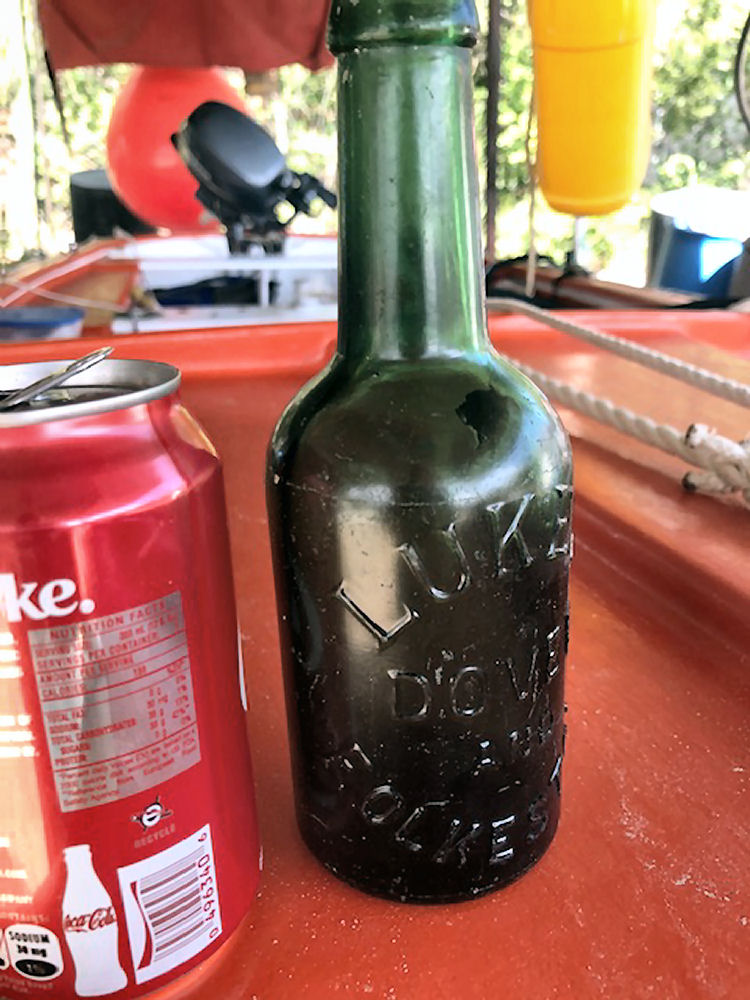 |
 From the Post Office Directory 1901 From the Post Office Directory 1901
|








